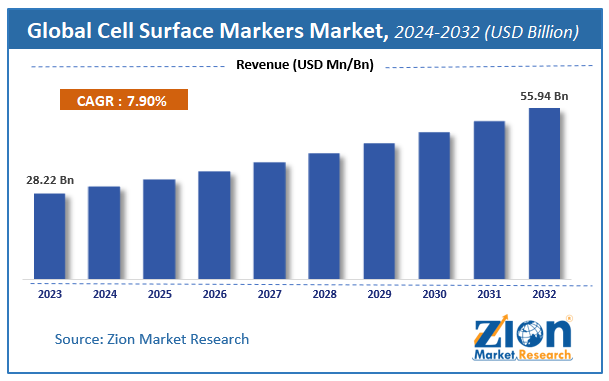Cell Surface Markers Market Size, Share, Trends and Forecasts to 2032

Cell Surface Markers Market By Product (antibodies and PCR Arrays. The source segment is classified into mice, rats, and other sources.), By cell type (monocyte cell surface markers, NK cell surface markers, T cell surface markers, B cell surface markers, and other cell types.), By application (research applications and clinical applications.), By end-user (hospitals & clinical testing laboratories, academic & research institutes, and pharmaceutical & biotechnology companies.) And By Region: - Global Industry Analysis, Size, Share, Growth, Trends, and Forecast, 2024-2032
| Market Size in 2023 | Market Forecast in 2032 | CAGR (in %) | Base Year |
|---|---|---|---|
| USD 28.22 Billion | USD 55.94 Billion | 7.9% | 2023 |
Description
Cell Surface Markers Market Insights
According to the report published by Zion Market Research, the global Cell Surface Markers Market size was valued at USD 28.22 Billion in 2023 and is predicted to reach USD 55.94 Billion by the end of 2032. The market is expected to grow with a CAGR of 7.9% during the forecast period. The report analyzes the global Cell Surface Markers Market's growth drivers, restraints, and impact on demand during the forecast period. It will also help navigate and explore the arising opportunities in the Cell Surface Markers industry.
Global Cell Surface Markers Market: Overview
The human body is a complex environment consisting of several types of cells that interacts with each other and their environment. To understand the several interactions, cells need to be separated from one another in an identifiable manner. Cell surface markers help to distinguish cell types from one another. Cell surface markers are nothing but carbohydrates and proteins which are attached to the cellular membrane, permitting cell surface markers to play an essential role in intercellular signaling.
Global Cell Surface Markers Market: Growth Factors
The global cell surface markers market is growing at a speedy rate. Rise in the prevalence of cancer, increase in funding in life science for cell surface marker-based research, and growing research in the field of neurobiology & stem cell research are the key aspects that are fostering the growth of the global market. As per the data published by WHO, in 2018, nearly 9.6 million people across the world have been estimated to have died from cancer, and every year over 300,000 new cases of cancer are diagnosed. Cell surface markers help to classify and identify cells as the protein on the surface of cancerous cells acts as a marker for specific types of tumors.
Thus, identification of the molecule can further enhance the process of diagnosis, drug discovery, and much more. This is driving the growth of the global market. In addition to this, the increase in the focus of biotechnology companies in the preparation of markers is also equally contributing to the growth of the global cell surface markers market. Further, factors such as increase in the study of fungal infections, expanding use of diagnostics, and increase in laboratory automation are also boosting the growth of the global market. Furthermore, advancement in high throughput techniques and tools may have advantageous opportunities for the growth of the global cell surface markers market during the forecast period. However, the requirement of high initial cost for sophisticated models may restrain the growth of the global cell surface markers market.
The COVID-19 pandemic is projected to have a substantial impact on the cell surface markers market. Cell surface markers play a crucial role in studying intercellular signaling. This is an important step to identify any foreign protein or carbohydrate interaction with the cell membrane. With the rapid surge in research to identify COVID-19 virus protein interactions with cell, demand for cell surface markers increased at a significant rate. In addition to this, increasing research on the development of COVID-19 drugs by several pharma and biotech companies is expected to boom the market growth over the forecast period.
Global Cell Surface Markers Market: Segmentation
The global cell surface markers market is categorized into product, source, cell type, applications, end-user, and region.
Based on the product, the global cell surface markers market is bifurcated into antibodies and PCR Arrays. The source segment is classified into mice, rats, and other sources.
By cell type, the market is categorized into monocyte cell surface markers, NK cell surface markers, T cell surface markers, B cell surface markers, and other cell types.
The application segment is divided into research applications and clinical applications.
The end-user segment is categorized into hospitals & clinical testing laboratories, academic & research institutes, and pharmaceutical & biotechnology companies.
Cell Surface Markers Market: Report Scope
| Report Attributes | Report Details |
|---|---|
| Report Name | Cell Surface Markers Market |
| Market Size in 2023 | USD 28.22 Billion |
| Market Forecast in 2032 | USD 55.94 Billion |
| Growth Rate | CAGR of 7.9% |
| Number of Pages | 214 |
| Key Companies Covered | Becton, Dickinson and Company, QIAGEN N.V, Thermo Fisher Scientific, Cell Signaling Technology, BioLegend, GenScript, Abcam, Danaher Corporation, Bio-Rad Laboratories, and F. Hoffman-La Roche |
| Segments Covered | By product, By source, By cell type, By applications, By end-user and By Region |
| Regions Covered | North America, Europe, Asia Pacific (APAC), Latin America, Middle East, and Africa (MEA) |
| Base Year | 2023 |
| Historical Year | 2018 to 2022 |
| Forecast Year | 2024 - 2032 |
| Customization Scope | Avail customized purchase options to meet your exact research needs. Request For Customization |
Global Cell Surface Markers Market: Regional Analysis
North America is anticipated to remain the largest market for cell surface markers during the forecast period. Some of the prime factors that are flourishing the market growth in the region include increasing use of cell surface markers in drug discovery & development and personalized medicine. In addition to this, a growing number of research activities in the U.S. market are also supporting the growth of the market. Asia Pacific is projected to register healthy market growth during the forecast period. The rapid growth of the market is attributed to increasing investment in research activities and the presence of a well-developed life science sector.
Global Cell Surface Markers Market: Competitive Players
The key players that are functioning in the global cell surface markers market are
- Becton
- Dickinson and Company
- QIAGEN N.V
- Thermo Fisher Scientific
- Cell Signaling Technology
- BioLegend
- GenScript
- Abcam
- Danaher Corporation
- Bio-Rad Laboratories
- F. Hoffman-La Roche.
The Global Cell Surface Markers Market segments are as follows:
By Product
- antibodies and PCR Arrays
- mice
- rats
- other sources
By cell type
- monocyte cell surface markers
- NK cell surface markers
- T cell surface markers
- B cell surface markers
- other cell types.
By application
- research applications
- clinical applications.
By end-user
- hospitals & clinical testing laboratories
- academic & research institutes
- pharmaceutical & biotechnology companies.
Global Cell Surface Markers Market: Regional Segment Analysis
- North America
- The U.S.
- Canada
- Europe
- France
- The UK
- Spain
- Germany
- Italy
- Rest of Europe
- Asia Pacific
- China
- Japan
- India
- South Korea
- Southeast Asia
- Rest of Asia Pacific
- Latin America
- Brazil
- Mexico
- Rest of Latin America
- Middle East & Africa
- GCC
- South Africa
- Rest of Middle East & Africa
What Reports Provides
- Full in-depth analysis of the parent market
- Important changes in market dynamics
- Segmentation details of the market
- Former, on-going, and projected market analysis in terms of volume and value
- Assessment of niche industry developments
- Market share analysis
- Key strategies of major players
- Emerging segments and regional markets
- Testimonials to companies in order to fortify their foothold in the market.
Table Of Content
FrequentlyAsked Questions
Rise in the prevalence of cancer, increase in funding in life science for cell surface marker-based research, and growing research in the field of neurobiology & stem cell research are the key aspects that are fostering the growth of the global market. Furthermore, advancement in high throughput techniques and tools may have advantageous opportunities for the growth of the global cell surface markers market during the forecast period.
The key players that are functioning in the global cell surface markers market are Becton, Dickinson and Company, QIAGEN N.V, Thermo Fisher Scientific, Cell Signaling Technology, BioLegend, GenScript, Abcam, Danaher Corporation, Bio-Rad Laboratories, and F. Hoffman-La Roche.
North America is anticipated to remain the largest market for cell surface markers during the forecast period. Some of the prime factors that are flourishing the market growth in the region include increasing use of cell surface markers in drug discovery & development and personalized medicine. In addition to this, a growing number of research activities in the U.S. market are also supporting the growth of the market.
HappyClients
Zion Market Research
Tel: +1 (302) 444-0166
USA/Canada Toll Free No.+1 (855) 465-4651
3rd Floor,
Mrunal Paradise, Opp Maharaja Hotel,
Pimple Gurav, Pune 411061,
Maharashtra, India
Phone No +91 7768 006 007, +91 7768 006 008
US OFFICE NO +1 (302) 444-0166
US/CAN TOLL FREE +1 (855) 465-4651
Email: sales@zionmarketresearch.com
We have secured system to process your transaction.
Our support available to help you 24 hours a day, five days a week.
Monday - Friday: 9AM - 6PM
Saturday - Sunday: Closed







